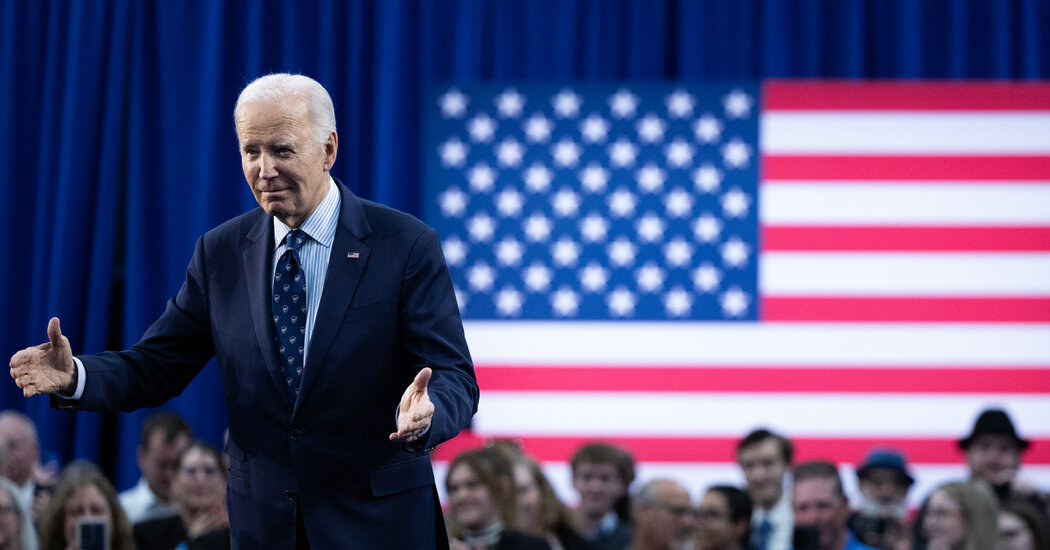
Is President Biden gaining in the polls? There have been signs of it ever since his State of the Union address last month, and a New York Times/Siena College poll released Saturday morning is the latest hint.
Donald J. Trump led Mr. Biden by one percentage point among likely voters nationwide, 47 percent to 46 percent. It represents a modest improvement for the president since February, when Mr. Trump led our poll by four points among likely voters. (The one-point difference is the same with registered voters.)
You can’t exactly call a one-point deficit the “Biden comeback,” but the result adds to a growing list of polls finding him inching up over the last month.
So far, 16 national pollsters (of varying quality) have taken polls before and after the State of the Union. On average, Mr. Biden is running about 1.4 points better in the post-State of the Union polls than in earlier surveys by the same pollsters.
A 1.4-point shift in the polls wouldn’t usually merit much attention. It’s small enough that it may not last, even if it’s real. But it carries greater significance against the backdrop of the last six months — and the doubts among some Democrats about Mr. Biden’s candidacy.
Mr. Trump has held an uninterrupted lead in the polling since October, even though a rising stock market and surging consumer confidence seemed to create the conditions for a Biden comeback. The president’s inability to capitalize on an improving economy against a candidate accused of several federal crimes was a powerful reason for pessimism about his chances. It seemed to raise the possibility that his age (81) was disqualifying for many voters, or even that a big part of the country had written him off.
The movement in Mr. Biden’s direction over the last month is slight, but it may be just enough to suggest that he’s beginning to benefit from improving political conditions. The last month was full of the kinds of events and news that seemed potentially favorable for him:
-
The primaries are over. The reality of a Trump-Biden rematch could be setting in, possibly helping Mr. Biden.
-
The State of the Union helped quiet Democratic concerns about his age, which dominated the political conversation in February.
-
Abortion is back in the news. Over the last few weeks, a state court ruling allowed Florida’s six-week abortion ban to soon become law, and Arizona’s 19th-century ban was resuscitated. As calls were being made for the Times/Siena poll this week, Google searches for abortion reached their highest levels since the 2022 midterm election.
-
The Biden campaign is underway. In the wake of the State of the Union, the campaign launched an aggressive and mostly uncontested early effort in the battleground states, both on the ground and in the air.
-
Consumer sentiment is up. This was already true back in February, but it’s plausible to expect a lag between improved economic conditions and political gains for Mr. Biden.
Yet Mr. Biden still trails in the poll, despite these favorable trends. His approval rating is stuck in the upper 30s, and just 41 percent say they have a favorable view of the president — far lower than four years ago, and lower than voters’ views of Mr. Trump now. Voters still believe the economy is poor, and disapprove of Mr. Biden’s handling of the economy by nearly a two-to-one margin.
But if the last month hadn’t helped Mr. Biden at all, the doubts about his candidacy would have only grown. Instead, a slight shift his way makes it easier to imagine further gains ahead.
With seven months to go until the election, that’s not unrealistic to contemplate, even if it’s not at all assured. Many voters still aren’t tuned in — especially the less engaged, young and nonwhite voters who are currently propelling Mr. Trump’s strength in the polling.
On paper, an incumbent president running with a healthy economy should be favored to win.
You can read our full write-up of the poll here.
What about Kennedy?
We didn’t list Robert F. Kennedy Jr. as an option in the presidential race. He has gotten on the ballot in very few states, and adding him makes it harder to compare our results with those from previous surveys.
That said, this could easily be the last time he’s omitted from a Times/Siena poll. For one, he may succeed in obtaining greater ballot access in the weeks ahead. For another, it’ll become less important to compare our surveys with our polls from 2023, and more important to facilitate a later comparison with our surveys in the fall, by which time Mr. Kennedy hopes to be on the ballot everywhere.
With that possibility in mind, we took a small interim step: We made it possible for the interviewer to record when respondents said they supported Mr. Kennedy, even though we didn’t list him as an option. Overall, just under 2 percent of respondents said they backed Mr. Kennedy when we asked them about the Biden vs. Trump matchup.